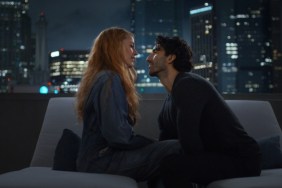Documentary Shorts

I’ll begin withe The Reaper, the only short film in this category I didn’t watch and I didn’t watch it because simply knowing EfraÃn, the film’s subject, has worked in a slaughterhouse for over 25 years, slaughtering approximately 500 bulls a day is enough for me to not need to watch it. I watched enough to know director Gabriel Serra Arguello has a fascinating eye for his subject, he’s not a “stand back and get the wide shot” kind of filmmaker, which, in fact is one reason I didn’t think I could watch the whole thing. Bloody aprons, walls, rivers of gore and guts combined with EfraÃn’s no bullshit approach to his job was enough for me, not to mention the shot Arguello captures of a bull’s eyes before it’s led to slaughter. It’s something of a modern look at a similar story to that which Georges Franju explored in 1949’s Le sang des bêtes (Blood of the Beasts)… in color!
White Earth is easily the most palatable of the bunch, if only because it doesn’t involve some sort of intimate look at human or animal suffering. Of course, it is a bit of a hot button topic given it takes us to the North Dakota town in the film’s title and explores the life of the oil field workers there through the eyes of the children. It begins with one child that doesn’t go to school and spends most of his day throwing ninja stars, running in the snow and waiting for his dad to come home.
It’s unlikely to win because it doesn’t have an immediate emotional punch, but the final lesson taken from that very same child is a truly powerful one:
“I don’t really care about the oil fields. It’s not like I’m 18 yet. Whenever I’m 18 I might have to actually take an oil field job and, you know, old enough to think about how much money I have in my pocket. If I have to take a job in the oil fields, then I’m going to have to say, ‘Oh yeah, I do care about the oil,’ but if I don’t have to them I’m just going to say, ‘I don’t care about it.'”
Our Curse is one I had almost as hard a time watching as I had with The Reaper as director Tomasz Sliwinski turned the camera on himself and his wife to capture their experience dealing with their first born child as he just returns home from the hospital, suffering from an incurable respiratory condition called Ondine’s curse, a condition that leaves the patient on ventilator for the rest of their life. Dealing with the hardship of such a realization this one tugs at your heart strings almost immediately as the opening shot of Sliwinski and his wife is almost too much to bear on its own. Thankfully the film doesn’t spend its entire duration drenched in sadness.
If you’re an HBO subscriber you can watch Crisis Hotline: Veterans Press 1 on HBOGo right now after it first aired on the cable network back in November. It’s also too bad for the live action nominee, The Phone Call that this one was also nominated this year as it takes you inside an actual crisis hotline center, offering a look at a real look at what goes on behind the scenes. As the title clearly alludes to, this one focuses on military veterans suffering a new set of traumas once they return home from war. Given the immediacy of the subject matter it’s hard not to pick this one to win and should it win I wouldn’t be the least surprised.
My pick for winner, however, is Joanna, the second Polish entry in the field (Our Curse being the other). This was the first of these I watched and wow, afterward I wasn’t sure I wanted to watch any more. This is not happy subject matter people as the title character and subject of the documentary is dying of cancer and as well as writing a blog, has set out to capture her final days as a record of her life for her young son, Jas.
Thanks to her blog, for many people Joanna has become an icon of a thoughtful and joyful life. The blog describes her daily life honestly and accurately: her goals are as simple as a family trip to the Polish lake district; her planning as short-term as witnessing her son’s first successful bike ride without training wheels. She starts the blog when she finds out she has cancer and is given three months to live. Then she promises her 5-year-old son, Jas, that she will do her best to survive for as long as possible. And she starts writing for him. The documentary shows the everyday existence of Joanna, her husband Piotr, and little Jas. It is as discreet as it is moving. Through few well-chosen words and observations it manages to be both essential and sensuous. A story of thoughtfulness in death, life and love.
I had to take a break after watching this one and while it’s good, I’m sorry, but it’s a painful movie to watch.









